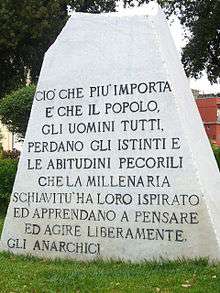

Anarchism is a social philosophy which considers the state undesirable, unnecessary, and harmful, and instead promotes stateless societies, or anarchy. Anarchists seek to diminish or even eliminate reliance upon claims of authority in the conduct of human relations, but thus have widely disagreed on what additional criteria are essential or beneficial to anarchism and human society. It is usually identified as the most anti-authoritarian of social philosophies.
- See also:
- Anarchists (article listings)
- Anarcho-capitalism
- Anarcho-primitivism
- Christian anarchism
- Social anarchism
A

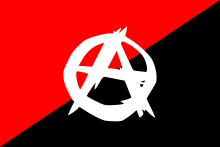
- Alphabetized by author or source
- Anarchism is founded on the observation that since few men are wise enough to rule themselves, even fewer are wise enough to rule others.
- Edward Abbey, in A Voice Crying in the Wilderness (Vox Clamantis en Deserto) : Notes from a Secret Journal (1990)
- Anarchism is not a romantic fable but the hardheaded realization, based on five thousand years of experience, that we cannot entrust the management of our lives to kings, priests, politicians, generals, and county commissioners.
- Edward Abbey, in A Voice Crying in the Wilderness (Vox Clamantis en Deserto) : Notes from a Secret Journal (1990)
- Anarchism...rests upon the doctrine that no man has a right to control by force the action of any other man.
Anarchism is defended on historic grounds: the evils are recited which have been wrought in human history by the employment of force compelling obedience by one will to another will, as they are seen in political and religious despotism, in the subjugation of women, in every form of brigandage from that of the Italian bands to that of the Napoleonic armies. It is conceded that evils might grow out of the abolition of all government; but it is insisted that they would be insignificant in comparison with the wrongs which have been perpetrated on mankind by the authority of government. Anarchism is defended on religious grounds. Jesus Christ is cited as the first of anarchists; for did he not say, "Resist not evil: if one take away thy coat, give him thy cloak also; and if one smite thee upon the one cheek, turn to him the other also?" What is this, we are asked, but a denial of the right to use force even in defense of one's simplest and plainest rights?- Lyman Abbott, "The Cause and Cure of Anarchism" in The Outlook, Volume 70 (February 1902)
- The theory or doctrine that all forms of government are oppressive and undesirable and should be abolished … Rejection of all forms of coercive control and authority.
- Anarchy and statism are incompatible, which explains why statists must mislead people by defining anarchy as chaos and disorder. Somebody once declared that the only two political theories that are completely consistent are anarchy and totalitarianism. Anarchy fully embraces the concept of self, totalitarianism fully rejects that concept. Statism always degenerates into totalitarianism.
- Darrell Anderson, in "What Is Liberty?"
- Jesus Christ was the supreme example of authentic anarchy — the creative non-violent anarchist par excellence — working not from the top down, but from the bottom up with the poor, and the poorest of the poor, to empower people and enable them to realize their potential, as men and women made in the images of God.
- Dave Andrews, in Christi-Anarchy: Discovering a Radical Spirituality of Compassion (1999), p. 73
- The Boston Anarchists are opposed to mob rule.
For this reason they are opposed to the State, whose rule is nothing less than mob rule, since all arbitrary rule which is enforced by brutal agencies is mob rule. The State, then, is the chief of mobbists.
- Since the late Chicago outrages I have been patronizingly told how unfortunate it is that the Boston Anarchists, standing as they do for peace, and being the first to denounce violence, should suffer themselves to be confounded with those bloody mobbists who desecrate the true principles of Anarchism through deeds which Liberty emphatically repudiates.
On the whole, the term Anarchy is the proper one. It simply means opposed to the arbitrary rule of self-elected usurpers outside of the Individual.
- As the word "anarchy" etymologically signifies the negation of governmental authority, the absence of government, it follows that one indissoluble bond unites the anarchists. This is antagonism to all situations regulated by imposition, constraint, violence, governmental oppression, whether these are a product of all, a group, or of one person. In short, whoever denies that the intervention of government is for human relationships is an anarchist.
But this definition would have only a negative value did it not possess, as a practical complement, a conscious attempt to live outside this domination and servility which are incompatible with the anarchist conception. An anarchist, therefore, is an individual who, whether he has been brought to it by a process of reasoning or by sentiment, lives to the greatest possible extent in a state of legitimate defence against authoritarian encroachments. From this it follows that anarchist individualism — the tendency which we believe contains the most profound realization of the anarchist idea — is not merely a philosophical doctrine — it is an attitude, an individual way of life.
B
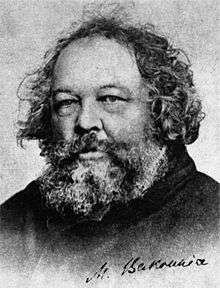


- Modern Anarchism … is primarily a tendency — moral, social, and intellectual. As a tendency it questions the supremacy of the State, the infallibility of statute laws, and the divine right of all authority, spiritual or temporal. It is, in truth, a product of Authority, the progeny of the State, a direct consequences of the inadequacy of law and government to fulfill their assumed functions. In short, the Anarchist tendency is a necessity of progress, a protest against usurpation, privilege, and injustice.
- William Bailie, in The Anarchist Spirit (1906)
- Anarchism is "stateless socialism."
- Anarchism is the purity of rebellion. A pig who struggles wildly and rends the air with his cries while he is held to be slaughtered, and a baby who kicks and screams when, wanting warmth and his mother's breast, he is made to wait in the cold—these are two samples of natural rebellion. Natural rebellion always inspires either deep sympathy and identification with the rebelling creature, or a stiffening of the heart and an activation of aggressive-defensive mechanisms to silence an accusing truth. This truth is that each living being is an end in itself; that nothing gives a being the right to make another a mere instrument of his purposes.
- Giovanni Baldelli, Social Anarchism (1971), p. 1
- For the anarchist, rebellion is not only a statement of will but a statement of rightness and truth.
- Giovanni Baldelli, Social Anarchism (1971), p. 2
- We started off trying to set up a small anarchist community, but people wouldn't obey the rules.
- Alan Bennett, Getting On (1972), Act I
- There is absolute truth in anarchism and it is to be seen in its attitude to the sovereignty of the state and to every form of state absolutism. [...] The religious truth of anarchism consists in this, that power over man is bound up with sin and evil, that a state of perfection is a state where there is no power of man over man, that is to say, anarchy. The Kingdom of God is freedom and the absence of such power... the Kingdom of God is anarchy.
- Nikolai Berdyaev, Slavery and Freedom (1939), pp.147–8
- Anarchism means that you should be free; that no one should enslave you, boss you, rob you, or impose upon you.
It means that you should be free to do the things you want to do; and that you should not be compelled to do what you don't want to do.
It means that you should have a chance to choose the kind of a life you want to live, and live it without anybody interfering.
It means that the next fellow should have the same freedom as you, that every one should have the same rights and liberties.
It means that all men are brothers, and that they should live like brothers, in peace and harmony.
That is to say, that there should be no war, no violence used by one set of men against another, no monopoly and no poverty, no oppression, no taking advantage of your fellow-man.
In short, Anarchism means a condition or society where all men and women are free, and where all enjoy equally the benefits of an ordered and sensible life.
- The more enlightened man will become, the less he will employ compulsion and coercion. The really civilized man will divest himself of all fear and authority. He will rise from the dust and stand erect: he will bow to no tsar either in heaven or on earth. He will become fully human when he will scorn to rule and refuse to be ruled. He will be truly free only when there shall be no more masters.
Anarchism is the ideal of such a condition; of a society without force and compulsion, where all men shall be equals, and live in freedom, peace, and harmony.
The word Anarchy comes from the Greek, meaning without force, without violence or government, because government is the very fountainhead of violence, constraint, and coercion.
Anarchy therefore does not mean disorder and chaos, as you thought before. On the contrary, it is the very reverse of it; it means no government, which is freedom and liberty. Disorder is the child of authority and compulsion. Liberty is the mother of order.
- Anarchism means voluntary co-operation instead of forced participation. It means harmony and order in place of interference and disorder.
- Alexander Berkman, in "Is Anarchy Possible?" in ABC of Anarchism (1929)
- Certainly the worker has nothing to lose by a change from government and capitalism to a condition of no government, of anarchy.
- Alexander Berkman, in "Is Anarchy Possible?" from ABC of Anarchism (1929)
- If there ever was an anarchist on Earth the gospel Jesus was one.
- Frank S. Billings, How Shall the Rich Escape? (1894), p. 54
- Almost anyone, I suppose, can call himself or herself an anarchist, if he or she believed that the society could be managed without the state. And by the state—I don't mean the absence of any institutions, the absence of any form of social organisation—the state really refers to a professional apparatus of people who are set aside to manage society, to preëmpt the control of society from the people. So that would include the military, judges, politicians, representatives who are paid for the express purpose of legislating, and then an executive body that is also set aside from society. So anarchists generally believe that, whether as groups or individuals, people should directly run society.
- Murray Bookchin, Anarchism in America, directed by Steven Fischler and Joel Such (15 January 1983).
- Anarchism is the doctrine that government should be abolished.
- Political theory holding all forms of government authority to be unnecessary and undesirable and advocating a society based on voluntary cooperation and free association of individuals and groups
- Anarchism is a cluster of doctrines and attitudes centred on the belief that government is both harmful and unnecessary.
- The Britannica Guide to Political Science and Social Movements That Changed the Modern World (2009) edited by Heather M. Campell , Ch. 5: Anarchism, p. 180
- While the popular understanding of anarchism is of a violent, anti-State movement, anarchism is a much more subtle and nuanced tradition then a simple opposition to government power. Anarchists oppose the idea that power and domination are necessary for society, and instead advocate more co-operative, anti-hierarchical forms of social, political and economic organization.
- L. Susan Brown, The Politics of Individualism : Liberalism, Liberal Feminism and Anarchism (1993), p. 106
- Anarchism is a theory of political science and is opposed to government in the political sense.
- Steven T. Byington, as quoted in "To Anarchists" by Henry Bool in Ithaca Journal (17 September 1901)
C
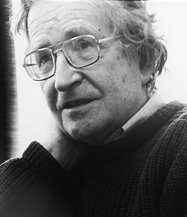
.jpg)

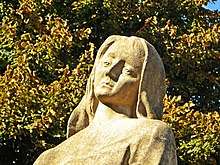

- The political belief that there should be little or no formal or official organization to society but that people should work freely together.
- "Anarchism" in Cambridge International Dictionary
- Reader, did you ever hear of "Constituted Anarchy"? Anarchy; the choking, sweltering, deadly and killing rule of No-rule; the consecration of cupidity, and braying folly, and dim stupidity and baseness, in most of the affairs of men? Slop-shirts attainable three halfpence cheaper, by the ruin of living bodies and immortal souls?
- Thomas Carlyle, Latter-Day Pamphlets, The Present Time 1850
- Anarchy means an absence of law. Sociologically it is the modern theory which proposes to do away with all existing forms of government and to organize a society which will exercise all its functions without any controlling or directive authority. It assumes as its basis that every man has a natural right to develop all his powers, satisfy all his passions, and respond to all his instincts. It insists that the individual is the best judge of his own capacity; that personal interest, well understood, tends to improve general conditions; that each one recognizes the advantage of justice in economic relations; and that mankind, in the man, is right in what it does. As a human being is a free, intelligent agent, any restraint from without is an invasion of his rights and must be set down as tyranny. … Criminals are not to be punished, but treated as lunatics, or sick men. There are to be no rulers in Church or State; no masters, no employers. Religion is to be eliminated, because it introduces God as the basis of authority, and degrades man by inculcating meekness and submission, thus making him a slave and robbing him of his natural dignity. Free love is to take the place of marriage, and family life, with its restraints, is to cease.
- The consistent anarchist … should be a socialist, but a socialist of a particular sort. He will not only oppose alienated and specialized labor and look forward to the appropriation of capital by the whole body of workers, but he will also insist that this appropriation be direct, not exercised by some elite force acting in the name of the proletariat.
- Noam Chomsky, as quoted in Anarchism: From Theory to Practice (1969) by Daniel Guérin
- Anarchism can be conceived as a kind of voluntary socialism, that is, as libertarian socialist or anarcho-syndicalist or communist anarchist, in the tradition of, say, Bakunin and Peter Kropotkin and others. They had in mind a highly organized form of society, but a society that was organized on the basis of organic units, organic communities. And generally, they meant by that the workplace and the neighborhood, and from those two basic units there could derive through federal arrangements a highly integrated kind of social organization which might be national or even international in scope. And these decisions could be made over a substantial range, but by delegates who are always part of the organic community from which they come, to which they return, and in which, in fact, they live.
- Dismantling the state is a core element of almost all left-anarchist thinking. Of course, that's a goal. It doesn't mean that this society should not be organized and governed; it should be, but by democratic institutions, based on natural modes of association. Here, incidentally, you begin to get differences of points of view and ideas, as to how human life and society should be organized. There's no doctrine. It's not like Marxism and Leninism where there are some books you read and that's what you believe. This is a tendency in thinking, nobody owns it. It's all generally based on the idea that hierarchic and authoritarian structures are not self-justifying. They have to have a justification. So if there is a relation of subordination and domination, maybe you can justify it, but there's a strong burden of proof on anybody who tries to justify it. Quite commonly, the justification can't be given. It's a relationship that is maintained by obedience, by force, by tradition, by one or another form of sometimes physical, sometimes intellectual or moral coercion. If so, it ought to be dismantled. People ought to become liberated and discover that they are under a form of oppression which is illegitimate, and move to dismantle it.
What happens next? We don't really know. There are people who think they know the answer. I'm not one of them. My view is, we don't understand very much about human beings or human affairs, so anything that would be done has to be experimentally tried, but I think there are some leading ideas that make some good sense.
- I, as an Anarchist, have no right to advise another to do anything involving a risk to himself; nor would I give a fillip for an action done by the advice of some one else, unless it is accompanied by a well-argued, well settled conviction on the part of the person acting, that it really is the best thing to do. Anarchism, to me, means not only the denial of authority, not only a new economy, but a revision of the principles of morality. It means the development of the individual, as well as the assertion of the individual. It means self-responsibility, and not leader-worship.
- Voltairine de Cleyre, in "In Defence of Emma Goldman and the Right of Expropriation" (1894) in Selected works of Voltairine de Cleyre (1914) edited byAlexander Berkman
- Among the fundamental likeness between the Revolutionary Republicans and the Anarchists is the recognition that the little must precede the great; that the local must be the basis of the general; that there can be a free federation only when there are free communities to federate; that the spirit of the latter is carried into the councils of the former, and a local tyranny may thus become an instrument for general enslavement.
- Voltairine de Cleyre, in "Anarchism & American Traditions" in Mother Earth (December 1908/January 1909)
- The sin our fathers sinned was that they did not trust liberty wholly. They thought it possible to compromise between liberty and government, believing the latter to be "a necessary evil," and the moment the compromise was made, the whole misbegotten monster of our present tyranny began to grow. Instruments which are set up to safeguard rights become the very whip with which the free are struck.
Anarchism says, Make no laws whatever concerning speech, and speech will be free; so soon as you make a declaration on paper that speech shall be free, you will have a hundred lawyers proving that "freedom does not mean abuse, nor liberty license"; and they will define and define freedom out of existence. Let the guarantee of free speech be in every man's determination to use it, and we shall have no need of paper declarations. On the other hand, so long as the people do not care to exercise their freedom, those who wish to tyrannize will do so; for tyrants are active and ardent, and will devote themselves in the name of any number of gods, religious and otherwise, to put shackles upon sleeping men.- Voltairine de Cleyre, in "Anarchism & American Traditions" in Mother Earth (December 1908/January 1909)
- As to the American tradition of non-meddling, Anarchism asks that it be carried down to the individual himself. It demands no jealous barrier of isolation; it knows that such isolation is undesirable and impossible; but it teaches that by all men's strictly minding their own business, a fluid society, freely adapting itself to mutual needs, wherein all the world shall belong to all men, as much as each has need or desire, will result.
And when Modern Revolution has thus been carried to the heart of the whole world — if it ever shall be, as I hope it will — then may we hope to see a resurrection of that proud spirit of our fathers which put the simple dignity of Man above the gauds of wealth and class, and held that to be an American was greater than to be a king.
In that day there shall be neither kings nor Americans — only Men ; over the whole earth, MEN.- Voltairine de Cleyre, in "Anarchism & American Traditions" in Mother Earth (December 1908/January 1909)
- Anarchism is that political philosophy which advocates the maximization of individual responsibility and the reduction of concentrated power — regal, dictatorial, parliamentary: the institutions which go loosely by the name of "government" — to a vanishing minimum.
- Alex Comfort, in the Preface of People Without Government (1982) by Harold Barclay, p. 7
- The tyrant — and every power structure is tyrannical — is not the head of the social body, but rather the parasite that poisons its organism. Killing it is an act of liberation. The Parisian revolutionary clubs did not suffer from the beheading of king Louis XVI, nor did the Russian workers’ councils suffer from the fall of Tsar Nicholas II. Rather, the liquidation of power, i.e., the insurrectional context that brought down the ancient customs and released new energies, is what really allowed their birth and their spread. And the reintroduction of power, in Jacobin or Bolshevik form, is what really brought about the stalemate and the ruin of the process of social regeneration, bringing that which is Unknown back to that which is State.
- May the barbarians break loose. May they sharpen their swords, may they brandish their battleaxes, may they strike their enemies without pity. May hatred take the place of tolerance, may fury take the place of resignation, may outrage take the place of respect. May the barbarian hordes go to the assault, autonomously, in the way that they determine. And may no parliament, no credit institution, no supermarket, no barracks, no factory ever grow again after their passage. In the face of the concrete that rises to strike the sky and the pollution that fouls it, one can well say with Dejacque that “It is not the darkness that the Barbarians will bring to the world this time, it is the light.”
- Chrisso and Odoteo, Barbarians: The Disordered Insurgence (2003), as cited in Thomas Nail, The Figure of the Migrant (Stanford University Press: 2015), p. 227
- There are no longer any noble ideas capable of stirring the great proletarian masses, there are no longer sweet Utopias ready to be fertilized by their lovers, there are no longer radical theories that only wait to be put into practice. All this has been overwhelmed, swept away by the imperial slime. There is only the disgust, the desperation, the repugnance of dragging our existence through the blood spilled by power and the mud flung up by obedience. And yet in the midst of this blood and mud, the will — confused in some and clearer in others — to put an end to the Empire and its deadly order once and for all can be born.
- Chrisso and Odoteo, Barbarians: The Disordered Insurgence (2003)
D
- Like the idea of democracy in early classical Greece and again in the seventeenth and eighteenth centuries in Europe and America, anarchism presents a novel vision of human possibilities, a society in which the major institution of organized coercion has disappeared. It would be easy and convenient to dismiss that vision as utterly impractical if it were not for the familiar fact that the revolutionary ideas of the impractical visionaries of one epoch sometimes become the orthdoxy of the next.
- Robert A. Dahl, Democracy and Its Critics (1989) Ch. 3 : Anarchism
- Yet despite our imperfect capacity for predicting human change, in appraising anarchism we cannot avoid judgments about human tendencies and possibilities.
- Robert A. Dahl, Democracy and Its Critics (1989) Ch. 3 : Anarchism
- In sum, the following judgments seem reasonable:
1. In the absence of a state, highly undesirable forms of coercion would probably persist.
2. In a stateless society, some associates might in any case acquire sufficient resources to create a highly oppressive state.
3. A degree of social control sufficient to avoid the creation of a state appears to require that an association be highly autonomous, very small, and united by multiple bonds.
4. Creating such associations on a significant scale in the world today appears to be either impossible or highly undesirable.These judgments support the conclusion that it would be better to try to create a satisfactory state than try to exist in a society without a state.
- Robert A. Dahl, Democracy and Its Critics (1989) Ch. 3 : Anarchism
- Although the anarchist critique of democracy is unconvincing, it is important to recognize its strengths. As we saw, several of its assumptions are widely shared, among others by advocates of democracy. Moreover, in portraying the possibility of society without a state, anarchism reminds us that, as a form of social control, coercion by law is marginal in most societies most of the time and in democratic orders always.
- Robert A. Dahl, Democracy and Its Critics (1989) Ch. 3 : Anarchism
- If the average man had had his way there would probably never have been any state. Even today he resents it, classes death with taxes, and yearns for that government which governs least. If he asks for many laws it is only because he is sure that his neighbor needs them; privately he is an unphilosophical anarchist, and thinks laws in his own case superfluous. In the simplest societies there is hardly any government.
- Will Durant, in The Story of Civilization, Vol. I : Our Oriental Heritage (1935), Ch. III : The Political Elements of Civilization, p. 21
- I have been an Anarchist all my life. I hope I have remained one. I should consider it very sad indeed, had I to turn into a general and rule the men with a military rod. They have come to me voluntarily, they are ready to stake their lives in our antifascist fight. I believe, as I always have, in freedom. The freedom which rests on the sense of responsibility. I consider discipline indispensable, but it must be inner discipline, motivated by a common purpose and a strong feeling of comradeship.
- Buenaventura Durruti , on his military leadership against fascist troops in the Spanish Civil War, as quoted in "Durruti Is Dead, Yet Living" (1936), by Emma Goldman
- We have only one alternative: either to build a functioning industrial society or see freedom itself disappear in anarchy and tyranny.
- Peter Drucker in The Future of Industrial Man (1942), p. 28
E
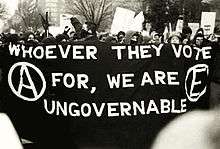
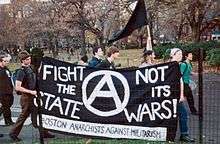
- Never do anything against conscience even if the state demands it.
- Albert Einstein, as quoted by Virgil Henshaw in Albert Einstein : Philosopher Scientist (1949) edited by Paul A. Schilpp
- There are different forms of anarchy and different currents in it. I must, first say very simply what anarchy I have in view. By anarchy I mean first an absolute rejection of violence.
- Jacques Ellul, in Anarchy and Christianity (1988), p. 11
- My aim is not the establishment of an anarchist society or the total destruction of the state. Here I differ from anarchists. I do not believe that it is possible to destroy the modern state. It is pure imagination to think that some day this power will be overthrown. From a pragmatic standpoint there is no chance of success. Furthermore, I do not believe that anarchist doctrine is the solution to the problem of organization in society and government. I do not think that if anarchism were to succeed we should have a better or more livable society. Hence I am not fighting for the triumph of this doctrine.
- Jacques Ellul, The Ethics of Freedom (1973 - 1974), p. 396
- Doctrine rejecting government: an ideology that rejects the need for a system of government in society and proposes its abolition … resistance to all forms of authority or control.
- "Anarchism" in Encarta World English Dictionary
- The anarchists put the thing upside down. They declare that the proletarian revolution must begin by doing away with the political organization of the state. But to destroy it at such a moment would be to destroy the only organism by means of which the victorious proletariat can assert its newly-conquered power, hold down its capitalist adversaries, and carry out that economic revolution of society without which the whole victory must end in a new defeat and a mass slaughter of the workers similar to those after the Paris commune.
F
- A number of persons claim that an anarchist cannot be a socialist, and a socialist not an anarchist. This is wrong. The philosophy of socialism is a general one, and covers several subordinate teachings. To illustrate, I will cite the word 'Christianity.' There are Catholics, Lutherans, Methodists, Baptists, Congregationalists, and various other religious sects, all of whom call themselves Christians. Although every Catholic is a Christian, it would not be correct to say that every Christian believes in Catholicism. Webster defined socialism thus: "A more orderly, equitable and harmonious arrangement of social affairs than has hitherto prevailed." Anarchism is aiming at this; anarchism is seeking a more just form of society. Therefore every anarchist is a socialist but every socialist is not necessarily an anarchist.
- Adolph Fischer, as quoted in Anarchism: Its Philosophy and Scientific Basis as Defined by Some of its Apostles (1887) edited by Albert Richard Parsons, p. 78
- Politically we are anarchists, and economically, communists or socialists. With regard to political organization the communistic anarchists demand the abolition of political authority, the state; we deny the right of a single class or single individual to govern or rule another class or individual. We hold that, as long as one man is under the dictation of another, as long as one man can in any form subjugate his fellow man, and as long as the means of existence can be monopolized by a certain class or certain individuals, there can be no liberty. Concerning the economical form of society, we advocate the communistic or co-operative method of production.
- Adolph Fischer, as quoted in Anarchism: Its Philosophy and Scientific Basis as Defined by Some of its Apostles (1887) edited by Albert Richard Parsons, p. 79
- The political, ethical, social, philosophical problem of our day is not to try to liberate the individual from the state and from the state's institutions but to liberate us both from the state and from the type of individualization which is linked to the state. We have to promote new forms of subjectivity through the refusal of this kind of individuality which has been imposed on us for several centuries.
- Michel Foucault, "The Subject and Power," Critical Inquiry, Vol. 8, No. 4. (Summer, 1982), p. 785
- anarchism (ăn`ərkĭzəm) [Gr.,=having no government], theory that equality and justice are to be sought through the abolition of the state and the substitution of free agreements between individuals. Central to anarchist thought is the belief that society is natural and that people are good but are corrupted by artificial institutions. Also central in anarchism are the belief in individual freedom and the denial of any authority, particularly that of the state, that hinders human development. Since the Industrial Revolution, anarchists have also opposed the concentration of economic power in business corporations
- Anarchists work towards a society of mutual aid and voluntary co-operation. We reject all government and economic repression.
- Mission statement of the newspaper Freedom (founded 1886)
G
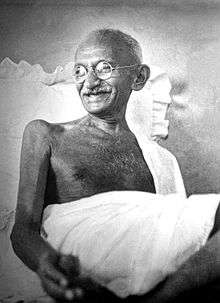
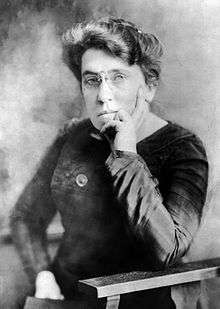
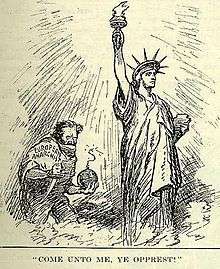
- The ideally non-violent state will be an ordered anarchy. That State is the best governed which is governed the least.
- Mohandas Karamchand Gandhi in Gandhi's Wisdom Box (1942), edited by Dewan Ram Parkash, p. 67 also in Collected works of Mahatma Gandhi Vol. 79 (PDF), p. 122
- Anarchism: The philosophy of a new social order based on liberty unrestricted by man-made law; the theory that all forms of government rest on violence, and are therefore wrong and harmful, as well as unnecessary.
- Anarchy stands for the liberation of the human mind from the dominion of religion; the liberation of the human body from the dominion of property; liberation from the shackles and restraints of government.
- Emma Goldman, in "Anarchism : What It Really Stands For" in Anarchism and Other Essays (1910)
- Anarchism is really a synonym for socialism. The anarchist is primarily a socialist whose aim is to abolish the exploitation of man by man. Anarchism is only one of the streams of socialist thought, that stream whose main components are concern for liberty and haste to abolish the State.
- We must shed the old stereotype of anarchists as bearded bomb throwers furtively stalking about city streets at night.
H
- A rational anarchist believes that concepts such as "state" and "society" and "government" have no existence save as physically exemplified in the acts of self-responsible individuals. He believes that it is impossible to shift blame, share blame, distribute blame … as blame, guilt, responsibility are matters taking place inside human beings singly and nowhere else. But being rational, he knows that not all individuals hold his evaluations, so he tries to live perfectly in an imperfect world … aware that his effort will be less than perfect yet undismayed by self-knowledge of self-failure.
- Robert A. Heinlein, in The Moon Is a Harsh Mistress (1966)
- Anarchism is voluntary cooperation for good, with the right of secession. A Christian anarchist is therefore one who turns the other cheek, overturns the tables of the moneychangers, and does not need a cop to tell him how to behave. A Christian anarchist does not depend upon bullets or ballots to achieve his ideal; he achieves that ideal daily by the One-Man Revolution with which he faces a decadent, confused, and dying world.
- Ammon Hennacy, "Christian Anarchism" in The Book of Ammon (1965)
- An anarchist is someone who doesn't need a cop to make him behave. Anarchism is voluntary cooperation with the right of secession. The individual or the family or the small group as a unit instead of the State.
- Ammon Hennacy, in The Book of Ammon (1965), p. 31
- Oh judge! Your damn laws! The good people don't need them, and the bad people don't obey them.
- Ammon Hennacy, Troester, Rosalie Riegle (1993). Voices from the Catholic Worker. Temple University Press. p. 114.
- We must therefore turn to history for enlightenment; here we find that none of the proclaimed anarchist groups correspond to the libertarian position, that even the best of them have unrealistic and socialistic elements in their doctrines. Furthermore, we find that all of the current anarchists are irrational collectivists, and therefore at opposite poles from our position. We must therefore conclude that we are not anarchists, and that those who call us anarchists are not on firm etymological ground, and are being completely unhistorical.
- Aubrey Herbert (a pseudonym Murray N. Rothbard used in the periodical Faith and Freedom), "Are Libertarians 'Anarchists'?" (unpublished, mid-1950s).
- The most interesting political questions throughout history have been whether or not humans will be ruled or free, whether they will be responsible for their actions as individuals or left irresponsible as members of society, and whether they can live in peace by volitional agreements alone.
The fundamental question of politics has always been whether there should be politics.
- Karl Hess, "Foreword" (1984) to The Market for Liberty (1970) by Linda & Morris Tannehill.
- Without the state there would be anarchy for that is, despite all the perfervid ravings of the Marxist Left and statist Right, all that anarchy means—the absence of the state, the opportunity for liberty.
- Karl Hess, "Foreword" (1984) to The Market for Liberty (1970) by Linda & Morris Tannehill.
- I AM an Anarchist.
All good men are Anarchists.
All cultured, kindly men; all gentlemen; all just men are Anarchists.
Jesus was an anarchist.
A Monarchist is one who believes a monarch should govern. A Plutocrat believes in the rule of the rich. A Democrat holds that the majority should dictate. An Aristocrat thinks only the wise should decide; while an Anarchist does not believe in government at all. Richard Croker is a Monarchist; Mark Hanna a Plutocrat; Cleveland a Democrat; Cabot Lodge an Aristocrat; William Penn, Henry D. Thoreau, Bronson Alcott and Walt Whitman were Anarchists. An Anarchist is one who minds his own business. An Anarchist does not believe in sending warships across wide oceans to kill brown men, and lay waste rice fields, and burn the homes of people who are fighting for liberty. An Anarchist does not drive women with babes at their breasts and other women with babes unborn, children and old men into the jungle to be devoured by beasts or fever or fear, or die of hunger, homeless, unhouseled and undone.
Destruction, violence, ravages, murder, are perpetrated by statute law.- Elbert Hubbard, in "The Better Part" in A Message to Garcia and Thirteen Other Things (1901), p. 131
- My faith is great: out of the transient darkness of the present the shadows will flee away, and Day will yet dawn. I am an Anarchist.
No man who believes in force and violence is an Anarchist. The true Anarchist decries all influences save those of love and reason. Ideas are his only arms.
Being an Anarchist I am also a Socialist. Socialism is the antithesis of Anarchy. One is the North Pole of Truth, the other the South.- Elbert Hubbard, in "The Better Part" in A Message to Garcia and Thirteen Other Things (1901), p. 132
I

- Jesus was an anarchist savior. That's what the Gospels tell us.
- The Muslim Anarchist Charter rejects absolutely:
all forms of violence and political coercion;
all forms of racism and prejudice, including Islamophobia, homophobia and neurelitism.
J
- There are different forms of anarchy and different currents in it. I must, first say very simply what anarchy I have in view. By anarchy I mean first an absolute rejection of violence.
- Jacques Ellul, Anarchy and Christianity [Anarchie et Christianisme] (1988) as translated by Geoffrey W. Bromiley (1991), p. 11
K
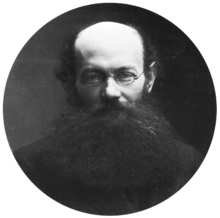
- A different conception of society, very different from that which now prevails, is in process of formation. Under the name of Anarchy, a new interpretation of the past and present life of society arises, giving at the same time a forecast as regards its future, both conceived in the same spirit as the above-mentioned interpretation in natural sciences. Anarchy, therefore, appears as a constituent part of the new philosophy, and that is why Anarchists come in contact, on so many points, with the greatest thinkers and poets of the present day.
- Peter Kropotkin, in Anarchism: Its Philosophy and Ideal (1898 edition, translated from the German by Harry Lyman Koopman); (1896 translation)
- It is often said that Anarchists live in a world of dreams to come, and do not see the things which happen today. We do see them only too well, and in their true colors, and that is what makes us carry the hatchet into the forest of prejudice that besets us.
- Peter Kropotkin, in Anarchism: Its Philosophy and Ideal (1898)
- Anarchy, when it works to destroy authority in all its aspects, when it demands the abrogation of laws and the abolition of the mechanism that serves to impose them, when it refuses all hierarchical organization and preaches free agreement — at the same time strives to maintain and enlarge the precious kernel of social customs without which no human or animal society can exist. Only, instead of demanding that those social customs should be maintained through the authority of a few, it demands it from the continued action of all.
- Peter Kropotkin, in Anarchism: Its Philosophy and Ideal (1898)
- The education we all receive from the State, at school and after, has so warped our minds that the very notion of freedom ends up by being lost, and disguised in servitude.
It is a sad sight to see those who believe themselves to be revolutionaries unleashing their hatred on the anarchist — just because his views on freedom go beyond their petty and narrow concepts of freedom learned in the State school.- Peter Kropotkin, in Anarchism: Its Philosophy and Ideal (1898)
- ANARCHISM (from the Gr. , and , contrary to authority), the name given to a principle or theory of life and conduct under which society is conceived without government — harmony in such a society being obtained, not by submission to law, or by obedience to any authority, but by free agreements concluded between the various groups, territorial and professional, freely constituted for the sake of production and consumption, as also for the satisfaction of the infinite variety of needs and aspirations of a civilized being.
- The best exponent of anarchist philosophy in ancient Greece was Zeno (342-267 or 270 B.C.), from Crete, the founder of the Stoic philosophy, who distinctly opposed his conception of a free community without government to the state-Utopia of Plato. He repudiated the omnipotence of the State, its intervention and regimentation, and proclaimed the sovereignty of the moral law of the individual — remarking already that, while the necessary instinct of self-preservation leads man to egotism, nature has supplied a corrective to it by providing man with another instinct — that of sociability. When men are reasonable enough to follow their natural instincts, they will unite across the frontiers and constitute the Cosmos. They will have no need of law-courts or police, will have no temples and no public worship, and use no money — free gifts taking the place of the exchanges. Unfortunately, the writings of Zeno have not reached us and are only known through fragmentary quotations. However, the fact that his very wording is similar to the wording now in use, shows how deeply is laid the tendency of human nature of which he was the mouthpiece.
- Peter Kropotkin, in "Anarchism" article in Encyclopedia Britannica (1910) "The Historical Development of Anarchism", as quoted in Anarchism: A Collection of Revolutionary Writings (1927), p. 288
- As an anarchist, I cannot reconcile myself to any government.
- Peter Kropotkin, as quoted in Peter Kropotkin : From Prince to Rebel (1990) by George Woodcock and Ivan Avakumovic, p. 428
L

- From my point of view the killing of another, except in defense of human life, is archistic, authoritarian, and therefore, no Anarchist can commit such deeds. It is the very opposite of what Anarchism stands for.
- The true founder of anarchy was Jesus Christ and … the first anarchist society was that of the apostles.
- Georges Lechartier, as quoted in Anarchism : A History of Libertarian Ideas and Movements (1962) by George Woodcock, Part One : The Idea, Ch. 2 : The Family Tree p. 36
- An anarchist is anyone who believes in less government than you do.
- Robert LeFevre, as quoted in "What Is Anarchy?" By Butler Shaffer, Lewrockwell.com (Jan. 13, 2004)
- To prevent the true meaning of his struggle against anarchism from being distorted, Marx expressly emphasized the "revolutionary and transient form" of the state which the proletariat needs. The proletariat needs the state only temporarily. We do not after all differ with the anarchists on the question of the abolition of the state as the aim. We maintain that, to achieve this aim, we must temporarily make use of the instruments, resources, and methods of state power against the exploiters, just as the temporary dictatorship of the oppressed class is necessary for the abolition of classes. Marx chooses the sharpest and clearest way of stating his case against the anarchists: After overthrowing the yoke of the capitalists, should the workers "lay down their arms", or use them against the capitalists in order to crush their resistance? But what is the systematic use of arms by one class against another if not a "transient form" of state?
- The nearer we come to the full military suppression of the bourgeoisie, the more dangerous becomes to us the high flood of petty-bourgeois Anarchism. And the struggle against these elements cannot be waged with propaganda and agitation alone. … The struggle must also be waged by applying force and compulsion.
- Vladimir Lenin, as quoted in The Guillotine At Work : Twenty Years of Terror In Russia (1940) by Grigoriĭ Petrovich Maksimov, p. 38
- Anarchism : Political concept and social movement that advocates the abolition of any form of State, which is regarded as coercive, and its replacement with voluntary organization.
- Carl Levy, "Anarchism" article for Encarta encyclopedia
- Anarchism, as the word signifies, is a philosophy that argues for a society without government. Its ethical values are of the highest. It prefers cooperation to competition, freedom to power, spontaneity to coercion.
- Leslie Lipson, The Great Issues Of Politics (Seventh Edition), p. 63
- Anarchy means no domination or authority of one man over another, yet you call that “disorder.” A system which advocates no such “order” as shall require the services of rogues and thieves to defend it you call “disorder.”
- I believe that Anarchism and Socialism are both needed in human society — that they represent two strong trends in human psychology — the trend toward liberty and individual variation, and the trend toward cooperation, sympathy and solidarity, and that therefore they should work together. Socialism greatly needs Anarchism as a critic and to keep it from sacrificing the individual and his originality to the domination of the mass.
- Certainly it is true that Christians, so far as they themselves are concerned, are subject neither to law nor sword, and have need of neither. But take heed and first fill the world with real Christians before you attempt to rule it in a Christian and evangelical manner. This you will never accomplish; for the world and the masses are and always will be un-Christian, even if they are all baptized and Christian in name.
- Martin Luther, Temporal Authority: To What Extent It Should Be Obeyed (1523), in Luther's Works, vol. 45 (1962), p. 91
M


- Anarchy is a word that comes from the Greek, and signifies, strictly speaking, "without government": the state of a people without any constituted authority.
Before such an organization had begun to be considered possible and desirable by a whole class of thinkers, so as to be taken as the aim of a movement (which has now become one of the most important factors in modern social warfare), the word “anarchy” was used universally in the sense of disorder and confusion, and it is still adopted in that sense by the ignorant and by adversaries interested in distorting the truth.
- Anarchists generally make use if the word "State" to mean all the collection of institutions, political, legislative, judicial, military, financial, etc., by means of which management of their own affairs, the guidance of their personal conduct, and the care of ensuring their own safety are taken from the people and confided to certain individuals, and these, whether by usurpation or delegation, are invested with the right to make laws over and for all, and to constrain the public to respect them, making use of the collective force of the community to this end.
- Errico Malatesta, in Anarchy (1891)
- We anarchists do not want to emancipate the people; we want the people to emancipate themselves.
- Errico Malatesta, in l'Agitazione (18 June 1897)
- By anarchist spirit I mean that deeply human sentiment, which aims at the good of all, freedom and justice for all, solidarity and love among the people; which is not an exclusive characteristic only of self-declared anarchists, but inspires all people who have a generous heart and an open mind...
- Errico Malatesta, Umanita Nova (13 April 1922)
- If you say that you reject violence when it exceeds the limits imposed by the needs of defense, they accuse you of pacifism, without understanding that violence is the whole essence of authoritarianism, just as the repudiation of violence is the whole essence of anarchism.
- Errico Malatesta, "Anarchism, Authoritarian Socialism and Communism" in Fede (28 October 1923); also in What Is Anarchism? : An Introduction edited by Donald Rooum (1992, 1995) p. 59
- I claimed that "individualist anarchism and communist anarchism are the same, or nearly so, in terms of moral motivations and ultimate goals".
I know that one could counter my claim with hundreds of texts and plenty of deeds of self-proclaimed individualist anarchists, which would demonstrate that individualist anarchist and communist anarchist are separated by something of a moral abyss.
However, I deny that that kind of individualists can be included among anarchists, despite their liking for calling themselves so.
If anarchy means non-government, non-domination, non-oppression by man over man, how can one call himself anarchist without lying to himself and the others, when he frankly claims that he would oppress the others for the satisfaction of his Ego, without any scruple or limit, other than that drawn by his own strength? He can be a rebel, because he is being oppressed and he fights to become an oppressor, as other nobler rebels fight to destroy any kind of oppression; but he sure cannot be anarchist. He is a would-be bourgeois, a would-be tyrant, who is unable to accomplish his dreams of dominion and wealth by his own strength and by legal means, and therefore he approaches anarchists to exploit their moral and material solidarity.
Therefore, I think the question is not about "communists" and "individualists", but rather about anarchists and non-anarchists. And we, or at least many of us, were quite wrong in discussing a certain kind of alleged "anarchist individualism" as if it really was one of the various tendencies of anarchism, instead of fighting it as one of the many disguises of authoritarianism.
- I think the question is not about "communists" and "individualists", but rather about anarchists and non-anarchists. And we, or at least many of us, were quite wrong in discussing a certain kind of alleged "anarchist individualism" as if it really was one of the various tendencies of anarchism, instead of fighting it as one of the many disguises of authoritarianism. … In the anarchist milieu, communism, individualism, collectivism, mutualism and all the intermediate and eclectic programmes are simply the ways considered best for achieving freedom and solidarity in economic life; the ways believed to correspond more closely with justice and freedom for the distribution of the means of production and the products of labour among men.
Bakunin was an anarchist, and he was a collectivist, an outspoken enemy of communism because he saw in it the negation of freedom and, therefore, of human dignity.- Errico Malatesta, in "Note to the article 'Individualism and Anarchism' by Adams" in Pensiero e Volontà No. 15 (1 August 1924)
- Ciò che più importa è che il popolo, gli uomini tutti, perdano gli istinti e le abitudini pecorili che la millenaria schiavitù ha loro ispirato ed apprendano a pensare ed agire liberamente. Gli anarchici.
- An array of philosophical and political positions arguing that human societies function best without government or authority, and which suggest that the natural state of people is one of living together harmoniously and freely, without intervention.
- "Anarchism" in The Oxford Dictionary of Sociology, (1998) 2nd edition, edited by Gordon Marshall
- Anarchism as a political philosophy seeks to dissolve all forms of authority and power, and if possible, wishes their complete abolition.
- Peter Marshall, in Demanding the Impossible: A History of Anarchism (1992), p. 47
- It is natural for people to say that anarchism must be a terrible thing when even the social democrats condemn it.
- Garrigue Masaryk, Thomas (1919), The Spirit of Russia, II, pp. 393
- A political theory holding all forms of governmental authority to be unnecessary and undesirable and advocating a society based on voluntary cooperation and free association of individuals and groups.
- "Anarchism" Merriam-Webster Dictionary
- One who rebels against any authority, established order, or ruling power.
- "Anarchist" Merriam-Webster Dictionary
- I believe that all other political states are in fact variations or outgrowths of a basic state of anarchy; after all, when you mention the idea of anarchy to most people they will tell you what a bad idea it is because the biggest gang would just take over. Which is pretty much how I see contemporary society. We live in a badly developed anarchist situation in which the biggest gang has taken over and have declared that it is not an anarchist situation – that it is a capitalist or a communist situation. But I tend to think that anarchy is the most natural form of politics for a human being to actually practice.
- Alan Moore, as quoted in Mythmakers & Lawbreakers (2009) by Margaret Killjoy, p. 42
- The twigs will be tied together in a neater and stronger bundle if they are all the same size and length. That’s fascism. It suggests that you have two contrary organisational principles involved … One is a kind of linear, meccano-like organisation – tie up all the sticks, make sure they are the same length, and you have a brick wall or something. The other one – anarchy – is a more fractal more natural more human organisational system in that it organises society in much the same way that we organise our personalities. Where it is purely the interplay of neurons – we haven’t got a king neuron that tells all the other neurons what to do. It seems to me to be a more emotionally natural way of working with other people.
- Alan Moore "Alan Moore Interview" by Matthew De Abaitua (1998), later published in Alan Moore: Conversations (2011) edited by Eric L. Berlatsky
- Anarchy – anarchon – no leaders. Which means, everybody is a leader. You can’t have an official set of rules for anarchy. I tend to think such connections casually, and break and form and break and form throughout our lives. If you look back ten years, you will remember a group of friends who you were productively involved with at that time, now some of them have drifted away, new people have come in. These are more naturalistic linkages, which exist while there is a need for them to exist. It’s more like the way ants work.
- Things tend to organise themselves. If there is any message from contemporary science, it is surely that. I am very fond of the anarchist proverb regarding laws – good people have no need for them, bad people pay no attention to them, what are they there for, other than as a symbol of power – ‘We can say this is law’. I could say I rule the universe, it depends on whether anyone believes me or not. To some degree, I don’t think the authorities care whether the law is observed or not, as long as it is there, and everyone accepts the idea of law. As long as they buy into the idea of law.
- We only know the world as we have lived in it. A lot of things we thought were givens have turned out to be local and temporary phenomena. Capitalism and communism felt like they were always going to be around, but it turns out they were just two ways of ordering an industrial society. If you were looking for more fundamental human political poles, you’d take anarchy and fascism, for my money. Which are not dependent upon economic trends because they are both a bit mad. One of them is complete abdication of individual responsibility into the collective, and one of them absolute responsibility for the individual. I think these will both still be with us, but fascism becomes less and less possible. We have to accept that we are moving towards some sort of anarchy.
- Alan Moore De Abaitua interview (1998)
- Our principle is: to prevent all command over man by his fellowmen, to, make state, government, laws, or whatsoever form of compulsion existing, a thing of the past, to establish full freedom for all. Anarchism means first and foremost freedom from all government.
N

- I began my political responsibility as an ultra-conservative. I wanted the Kaiser to come back; and now I am a revolutionary. I really mean that. If I live to be a hundred I shall maybe be an anarchist, for an anarchist wants to do without all government.
- Martin Niemöller, as quoted in Martin Niemöller, 1892-1984 (1984) by James Bentley, p. 223
- Anarchism is, fundamentally, an ethical critique of authority — almost an ethical duty to question and resist domination in all its forms.
- Saul Newman, in From Bakunin to Lacan ; Anti-Authoritarianism and the Dislocation of Power (2001), p. 166
- Anarchism is in reality the ideal of political and social science, and also the ideal of religion. It is the ideal to which Jesus Christ looked forward. Christ founded no church, established no state, gave practically no laws, organized no government and set up no external authority, but he did seek to write on the hearts of men God's law and make them self-legislating.
- Heber Newton, in Free Speech for Radicals (1916) by Theodore Schroeder, p. 7
- There is something radically wrong, he declares, in a system of society that functions and maintains its existence by the impetus of violence and force. He sees nothing praiseworthy in political society which has recourse to periodic wars, or need of jails, gallows and bludgeons — and it is because he is aware that these brutal weapons are the instruments of every government and State that he works for their destruction. …
Unlike the politician, he does not regard dishonesty, brutality and avariciousness as natural characteristics of human nature, but as the inevitable consequences of coercion and frustration engendered by artificial law, he believes that these social evils are best eradicated not by greater penalties and further legislation, but by the free development of the latent forces of solidarity and sympathetic understanding which government and law so ruthlessly suppress.
Freedom will be possible when people understand and desire it — for man can only rule where others subserviently obey. Where none obey, none has power to rule.- George Nicholson, in "The Simplicity of Anarchism" in Selections from Freedom: Volume 4 (1954); also in What Is Anarchism? : An Introduction edited by Donald Rooum (1992, 1995) p. 40
- Some anarchists have claimed not merely that we would be better off without a state, but that any state necessarily violates people's moral rights and hence is intrinsically immoral. Our starting point then, though nonpolitical, is by intention far from nonmoral. Moral philosophy sets the background for, and boundaries of, political philosophy. What persons may and may not do to one another limits what they may do through the apparatus of a state, or do to establish such an apparatus.
- Robert Nozick, in Anarchy, State, and Utopia (1974), Ch. 1 : Why State of Nature Theory?; Political Philosophy, p. 6
O
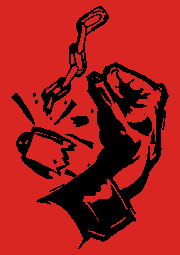
- Looking at the world as a whole, the drift for many decades has been not towards anarchy but towards the reimposition of slavery.
- George Orwell, in "You and the Atom Bomb", Tribune (19 October 1945); also in George Orwell: The Collected Essays, Journalism & Letters, Volume 4: In Front of Your Nose 1946–1950 (2000) by Sonia Orwell and Ian Angus, p. 9
P
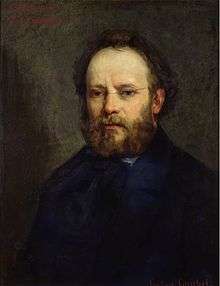
- The philosophy of anarchism is included in the word "Liberty"; yet it is comprehensive enough to include all things else that are conducive to progress. No barriers whatever to [[human] progression, to thought, or investigation are placed by anarchism; nothing is considered so true or so certain, that future discoveries may not prove it false; therefore, it has but one infallible, unchangeable motto, "Freedom." Freedom to discover any truth, freedom to develop, to live naturally and fully. Other schools of thought are composed of crystallized ideas — principles that are caught and impaled between the planks of long platforms, and considered too sacred to be disturbed by a close investigation. In all other "issues" there is always a limit; some imaginary boundary line beyond which the searching mind dare not penetrate, lest some pet idea melt into a myth. But anarchism is the usher of science — the master of ceremonies to all forms of truth. It would remove all barriers between the human being and natural development.
- Lucy Parsons, in The Principles of Anarchism
- Anarchists know that a long period of education must precede any great fundamental change in society, hence they do not believe in vote begging, nor political campaigns, but rather in the development of self-thinking individuals.
We look away from government for relief, because we know that force (legalized) invades the personal liberty of man, seizes upon the natural elements and intervenes between man and natural laws; from this exercise of force through governments flows nearly all the misery, poverty, crime and confusion existing in society.- Lucy Parsons, in The Principles of Anarchism
- Most anarchists believe the coming change can only come through a revolution, because the possessing class will not allow a peaceful change to take place; still we are willing to work for peace at any price, except at the price of liberty.
- Lucy Parsons, in The Principles of Anarchism
- Anarchy had been a word of fear in many countries for a long time, nowhere more so than in this one; nothing in that time, not even the word "Communism," struck such terror, anger, and hatred into the popular mind; and nobody seemed to understand exactly what Anarchy as a political idea meant any more than they understood Communism, which has muddied the waters to the point that it sometimes calls itself Socialism, at other times Democracy, or even in its present condition, the Republic. Fascism, Nazism, new names for very ancient evil forms of government — tyranny and dictatorship — came into fashion almost at the same time with Communism; at least the aims of those two were clear enough; at least their leaders made no attempt to deceive anyone as to their intentions. But Anarchy had been here all the nineteenth century, with its sinister offspring Nihilism, and it is a simple truth that the human mind can face better the most oppressive government, the most rigid restrictions, than the awful prospect of a lawless, frontierless world. Freedom is a dangerous intoxicant and very few people can tolerate it in any quantity; it brings out the old raiding, oppressing, murderous instincts; the rage for revenge, for power, the lust for bloodshed. The longing for freedom takes the form of crushing the enemy — there is always the enemy! — into the earth; and where and who is the enemy if there is no visible establishment to attack, to destroy with blood and fire? Remember all that oratory when freedom is threatened again. Freedom, remember, is not the same as liberty.
- Katherine Anne Porter, in The Never-Ending Wrong (1977)
- As man seeks justice in equality, so society seeks order in anarchy.
- Anarchy, — the absence of a master, of a sovereign [...]
- ANARCHY, or the government of each man by himself — or as the English say, self-government.
- Pierre-Joseph Proudhon, in The Federal Principle (1863)
- The notion of anarchy...means that once industrial functions have taken over from political functions, then business transactions and exchange alone produce the social order.
- Pierre-Joseph Proudhon, in The Federal Principle (1863)
- Anarchy is... a form of government or constitution in which public and private consciousness, formed through the development of science and law, is alone sufficient to maintain order and guarantee all liberties.
- Pierre-Joseph Proudhon, in a letter of 1864, published in Selected writings of Pierre-Joseph Proudhon (1969) edited by Stewart Edwards, p. 92; this has sometimes become misattributed to Leo Tolstoy.
- Laws: We know what they are, and what they are worth! They are spider webs for the rich and mighty, steel chains for the poor and weak, fishing nets in the hands of government.
- Pierre Joseph Proudhon, as quoted in The Principles Of Anarchism (1935) by Y. A. Merison
Q
- Islam ... is really a universal declaration of the freedom of man from servitude to other men and from servitude to his own desires, which is also a form of human servitude; it is a declaration that sovereignty belongs to God alone and that He is the Lord of all the worlds. It means a challenge to all kinds and forms of systems which are based on the concept of the sovereignty of man; it other words, where man has usurped the divine attribute. Any system in which the final decisions are referred to human beings, and in which the sources of all authority are human, deifies human beings by designating others than God as lords over men.
- Sayyid Qutb, Milestones (1964), p. 36
R


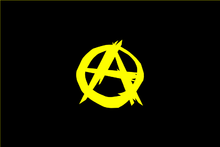
- I believe that the poet is necessarily an anarchist, and that he must oppose all organized conceptions of the State, not only those which we inherit from the past, but equally those which are imposed on people in the name of the future.
- Herbert Read, Poetry and Anarchism
- Jesus, in some respects, was an anarchist, for he had no idea of civil government. That government seems to him purely and simply an abuse.
A great social revolution, in which rank will be overturned, in which all authority in this world will be humiliated, was his dream.- Ernest Renan, in The Life of Jesus (1863), Ch. XII: Development of the ideas of Jesus respecting the Kingdom of God
- Violence, contrary to popular belief, is not part of the anarchist philosophy. It has repeatedly been pointed out by anarchist thinkers that the revolution can neither be won, nor the anarchist society established and maintained, by armed violence. Recourse to violence then is an indication of weakness, not of strength, and the revolution with the greatest possibilities of a successful outcome will undoubtedly be the one in which there is no violence, or in which violence is reduced to a minimum, for such a revolution would indicate the near unanimity of the population in the objectives of the revolution. …
Violence as a means breeds violence; the cult of personalities as a means breeds dictators — big and small — and servile masses; government — even with the collaboration of socialists and anarchists — breeds more government. Surely then, freedom as a means breeds more freedom, possibly even the Free Society! To Those who say this condemns one to political sterility and the Ivory Tower our reply is that 'realism' and their 'circumstantialism' invariably lead to disaster. We believe there is something more real, more positive and more revolutionary to resisting war than in participation in it; that it is more civilised and more revolutionary to defend the right of a fascist to live than to support the Tribunals which have the legal power to shoot him; that it is more realistic to talk to the people from the gutter than from government benches; that in the long run it is more rewarding to influence minds by discussion than to mould them by coercion.- Vernon Richards, in "Anarchism and Violence" in What Is Anarchism? : An Introduction edited by Donald Rooum (1992, 1995) p. 50
- Anarchism is a philosophy of freedom. It is a body of revolutionary ideas which reconciles, as no other revolutionary concept does, the necessity for individual freedom with the demands of society. The word "anarchy" has been universally used in the sense of disorder, chaos and confusion – even violence; and it is to this day used in that sense by the ignorant and uninformed as well as by political opponents with an interest in distorting the truth and gaining power, which is the universal goal of all politicians. It must be pointed out that violence, contrary to popular mythology, is not part of the anarchist philosophy. It has repeatedly been pointed out by anarchist thinkers that the revolution can neither be won, nor the anarchist society established and maintained, by armed violence.
- Jack Robinson, in "An Account of Anarchism"
- Anarchism is the view that a society without the state, or government, is both possible and desirable.
- The Shorter Routledge Encyclopedia of Philosophy (2005)
- I am an anarchist not because I believe anarchism is the final goal, but because there is no such thing as a final goal.
- Rudolf Rocker, in The London Years (1956)
- People forgot that industry is not an end in itself, but should be only a means to insure to man his material subsistence and to make accessible to him the blessings of a higher intellectual culture. Where industry is everything and man is nothing begins the realm of a ruthless economic despotism whose workings are no less disastrous than those of any political despotism. The two mutually augment one another, and they are fed from the same source.
- Rudolf Rocker, in Anarcho-Syndicalism (1989 Edition), Pluto Press, p. 10
- All these young millionaires were anarchists, of course: when a man possesses everything it is the supreme luxury for him to deny society: for in that way he can evade his responsibilities.
- Romain Rolland, in Jean-Christophe: Revolt (1905), p. 395
- Anarchism is opposed to states, armies, slavery, the wages system, the landlord system, prisons, monopoly capitalism, oligopoly capitalism, state capitalism, bureaucracy, meritrocracy, theocracy, oligarchy, governments, patriarchy, matriarchy, monarchy, oligarchy, protection rackets, intimidation by gangsters, and every other kind of coercive institution. In other words, anarchism opposes government in all it's forms.
- Donald Rooum, in What is Anarchism? (1992) ISBN 0900384662
- Anarchists are extreme libertarian socialists, "libertarian" meaning the demand for freedom from prohibition, and "socialist" meaning the demand for social equality. …Complete freedom implies equality, since if there are rich and poor, the poor cannot be permitted to take liberties with riches. Complete equality implies freedom, since those who suffer restrictions cannot be the equals of those who impose them.
- Donald Rooum, in What is Anarchism? (1992)
- All anarchists believe in worker's control, in the sense of individuals deciding what work whey do, how they work, and who they work with. This follows logically from the anarchist belief that nobody should be subject to a boss.
- Donald Rooum, in What is Anarchism? (1992)
- There are self-styled "anarcho-capitalists" (not to be confused with anarchists of any persuasion), who want the state abolished as a regulator of capitalism, and government handed over to capitalists.
- Donald Rooum, in What is Anarchism? (1992)
- I define anarchist society as one where there is no legal possibility for coercive aggression against the person or property of any individual. Anarchists oppose the State because it has its very being in such aggression, namely, the expropriation of private property through taxation, the coercive exclusion of other providers of defense service from its territory, and all of the other depredations and coercions that are built upon these twin foci of invasions of individual rights.
- I remember a man whom I knew when I was young, who was small, anaemic, and timid, but used to proclaim himself an anarchist. He never realised that his whole existence depended upon police protection, or that in a world without government he would be robbed of all his possessions and left to starve.
- Bertrand Russell, "Back to Nature?" (30 April 1934), in Mortals and Others: American Essays, 1931-1935 (1998), p. 111
S

- Anarchism is inspired by the moral-political ideal of a society untouched by relations of power and domination among human beings. This ideal has most often expressed itself in a doctrine advocating the total absence of government as the only firm basis for individual liberty and societal progress — a doctrine that some argue animates even Marxism (since Marx believed that eventually the state would wither away). Anarchism differs from political libertarianism in upholding a lack of government rather than limited government. There are several variants of anarchism, usually categorized by whether the variant is collectivistic (e.g., anarcho-syndicalism) or individualistic (e.g., anarcho-capitalism) in orientation. In popular usage, the term is often colored by the sometimes-violent anarchist political movement that was especially active in the years around 1900.
- Peter Saint-Andre in The Ism Book (1996)
- The writer is a spiritual anarchist, as in the depth of his soul every man is. He is discontented with everything and everybody. The writer is everybody's best friend and only true enemy — the good and great enemy. He neither walks with the multitude nor cheers with them. The writer who is a writer is a rebel who never stops.
- William Saroyan, in The William Saroyan Reader (1958)
- We are not the kind of people who, when the word "anarchism" is mentioned, turn away contemptuously and say with a supercilious wave of the hand: "Why waste time on that, it's not worth talking about!" We think that such cheap "criticism" is undignified and useless.
Nor are we the kind of people who console themselves with the thought that the Anarchists "have no masses behind them and, therefore, are not so dangerous." It is not who has a larger or smaller "mass" following today, but the essence of the doctrine that matters. If the "doctrine" of the Anarchists expresses the truth, then it goes without saying that it will certainly hew a path for itself and will rally the masses around itself. If, however, it is unsound and built up on a false foundation, it will not last long and will remain suspended in mid-air. But the unsoundness of anarchism must be proved.
Some people believe that Marxism and anarchism are based on the same principles and that the disagreements between them concern only tactics, so that, in the opinion of these people, no distinction whatsoever can be drawn between these two trends.
This is a great mistake.
We believe that the Anarchists are real enemies of Marxism. Accordingly, we also hold that a real struggle must be waged against real enemies.
- I say: liberate yourself as far as you can, and you have done your part; for it is not given to every one to break through all limits, or, more expressively, not to everyone is that a limit which is a limit for the rest. Consequently, do not tire yourself with toiling at the limits of others; enough if you tear down yours. [...] He who overturns one of his limits may have shown others the way and the means; the overturning of their limits remains their affair.
- Max Stirner, from The Ego and Its Own p. 187
T

- My political opinions lean more and more to Anarchy (philosophically understood, meaning abolition of control not whiskered men with bombs) … The most improper job of any man … is bossing other men. Not one in a million is fit for it, and least of all those who seek the opportunity.
- J. R. R. Tolkien, in a letter to his son Christopher Tolkien (29 November 1943)
- From the time that the heads of government assumed an external and nominal Christianity, men began to invent all the impossible, cunningly devised theories by means of which Christianity can be reconciled with government. But no honest and serious-minded man of our day can help seeing the incompatibility of true Christianity — the doctrine of meekness, forgiveness of injuries, and love — with government, with its pomp, acts of violence, executions, and wars. The profession of true Christianity not only excludes the possibility of recognizing government, but even destroys its very foundations.
- Leo Tolstoy, The Kingdom of God is Within You (1894), Ch. X
- The Anarchists are right in everything; in the negation of the existing order, and in the assertion that, without authority, there could not be worse violence than that of authority under existing conditions. They are mistaken only in thinking that Anarchy can be instituted by a revolution. "To establish Anarchy." "Anarchy will be instituted." But it will be instituted only by there being more and more people who do not require protection from governmental power, and by there being more and more people who will be ashamed of applying this power.
- Leo Tolstoy, "On Anarchy", in Pamphlets : Translated from the Russian (1900) as translated by Aylmer Maude, p. 22
- Understand then all of you, especially the young, that to want to impose an imaginary state of government on others by violence is not only a vulgar superstition, but even a criminal work. Understand that this work, far from assuring the well-being of humanity is only a lie, a more or less unconscious hypocrisy, camouflaging the lowest passions we posses.
- Leo Tolstoy, passage written for for The Law of Love and the Law of Violence (1908), released in 1917, as quoted in Equality in Liberty and Justice (2001) by Antony Flew, p. 89
- Anarchism … may be described as the doctrine that all the affairs of men should be managed by individuals or voluntary associations, and that the State should be abolished.
- Anarchism is for liberty, and neither for nor against anything else. Anarchy is the mother of co-operation, — yes, just as liberty is the mother of order; but, as a matter of definition, liberty is not order nor is Anarchism co-operation.
I define Anarchism as the belief in the greatest amount of liberty compatible with equality of liberty; or, in other words, as the belief in every liberty except the liberty to invade.- Benjamin Tucker, in "Socialism" in Liberty (10 March 1888); also in Instead of a Book: By A Man Too Busy To Write One : A Fragmentary Exposition of Philosophical Anarchism (1897)
- The idea that Anarchy can be inaugurated by force is as fallacious as the idea that it can be sustained by force. Force cannot preserve Anarchy; neither can it bring it. In fact, one of the inevitable influences of the use of force is to postpone Anarchy. The only thing that force can ever do for us is to save us from extinction, to give us a longer lease of life in which to try to secure Anarchy by the only methods that can ever bring it. But this advantage is always purchased at immense cost, and its attainment is always attended by frightful risk. The attempt should be made only when the risk of any other course is greater.
- Benjamin Tucker, Individual Liberty: Selections From the Writings of Benjamin R. Tucker, Passive Resistance. Vanguard Press, New York, 1926. Online text.
U
V
W



- In anarchy there is no automatic harmony.
- Kenneth Waltz, in Man, the State, and War (1954), Ch. VI : The Third Image, p. 160
- Better the rule of One, whom all obey,
Than to let clamorous demagogues betray
Our freedom with the kiss of anarchy.- Oscar Wilde, in Libertatis Sacra Fames (1881)
- Autrefois, j'étais poète et tyran. Maintenant je suis artiste et anarchiste.
- In the past I was a poet and a tyrant. Now I am an artist and an anarchist.
- Oscar Wilde in Poetry and Radical Politics in Fin de Siècle France: From Anarchism to Action française (Oxford: 2015), p. 133
- The genuine Anarchist looks with sheer horror upon every destruction, every mutilation of a human being, physical or moral. He loathes wars, executions and imprisonments, the grinding down of the worker's whole nature in a dreary round of toil, the sexual and economic slavery of women, the oppression of children, the crippling and poisoning of human nature by the preventable cruelty and injustice of man to man in every shape and form.
- Charlotte Wilson, in "Anarchism and Homicidal Outrage" in What Is Anarchism? : An Introduction edited by Donald Rooum (1992, 1995) p. 43
- There is no governor anywhere; you are all absolutely free. There is no restraint that cannot be escaped. We are all absolutely free. If everybody could go into dhyana at will, nobody could be controlled — by fear of prison, by fear of whips or electroshock, by fear of death, even. All existing society is based on keeping those fears alive, to control the masses. Ten people who know would be more dangerous than a million armed anarchists.
- Robert Anton Wilson, in Schrödinger's Cat Trilogy : The Trick Top Hat (1979)
- My early work is politically anarchist fiction, in that I was an anarchist for a long period of time. I'm not an anarchist any longer, because I've concluded that anarchism is an impractical ideal. Nowadays, I regard myself as a libertarian. I suppose an anarchist would say, paraphrasing what Marx said about agnostics being "frightened atheists," that libertarians are simply frightened anarchists. Having just stated the case for the opposition, I will go along and agree with them: yes, I am frightened. I'm a libertarian because I don't trust the people as much as anarchists do. I want to see government limited as much as possible; I would like to see it reduced back to where it was in Jefferson's time, or even smaller. But I would not like to see it abolished. I think the average American, if left totally free, would act exactly like Idi Amin. I don't trust the people any more than I trust the government.
- A lot of anarchists had a major role in influencing my political thinking, especially the individualist anarchists. Benjamin Tucker and Lysander Spooner especially. But I've also been influenced by Leo Tolstoy's anarcho-pacifism. And I find a lot of Kropotkin compatible even though he was a communist anarchist. Nothing wrong with communist anarchism as long as it remains voluntary. Any one that wants to go make a commune, go ahead, do it. I got nothing against it. As long as there's room to the individualist to do his or her own thing.
- "Whoever denies authority and fights against it is an anarchist," said Sebastien Faure. The definition is tempting in its simplicity, but simplicity is the first thing to guard against in writing a history of anarchism. Few doctrines or movements have been so confusedly understood in the public mind, and few have presented in their own variety of approach and action so much excuse for confusion.
- I shall treat anarchism, despite its many variations: as a system of social thought, aiming at fundamental changes in the structure of society and particularly — for this is the common element uniting all its forms — at the replacement of the authoritarian state by some form of non-governmental cooperation between free individuals.
- Anarchism is a manifestation of natural human urges … it is the tendency to create authoritarian institutions which is the transient aberration.
- A theory that advocates the abolition of all forms of government as a necessary step towards achieving political and social liberty.
- "Anarchism" in Wordsmyth English Dictionary
X

Mere anarchy is loosed upon the world. ~ William Butler Yeats
Y

Z

- Anarchism can be broadly defined as the belief that individual freedom and social good can be reconciled without coercive agents.
- Peter Zarrow, Anarchism and Chinese Political Culture (Columbia University Press, 1990), 2.
- If we once — and for so long — lived in balance with nature and each other, we should be able to do so again. The catastrophe that’s overtaking us has deep roots, but our previous state of natural anarchy reaches much further into our shared history.
- John Zerzan, in "Whose Future?", from the book Take My Advice : Letters to the Next Generation from People Who Know a Thing or Two (2007) by James L. Harmon
- Anarchism is the attempt to eradicate domination. This includes not only such obvious forms as the nation-state, with its routine use of violence and the force of law, and the corporation, with its institutionalized irresponsibility, but also such internalized forms as patriarchy, racism, homophobia. Also it is the attempt to expose the ways our philosophy, religion, economics, and other ideological constructions perform their primary function, which is to rationalize or naturalize — make seem natural — the domination that pervades our way of life: the destruction of the natural world or of indigenous peoples, for example, comes not from the result of decisions actively made and actions pursued, but instead, so we convince ourselves, as a manifestation of Darwinian selection, or God's will, or economic exigency. Beyond that, Anarchism is the attempt to look even into those parts of our everyday lives we accept as givens, as part of the universe, to see how they, too, dominate us or facilitate our domination over others... Most fundamentally, I would see Anarchism as a synonym for anti-authoritarianism.
- John Zerzan, in Running on Emptiness: The Pathology of Civilization (2008), p. 67-68)
Disputed
- Anarchism means no government, but it does not mean no laws and no coercion. This may seem paradoxical, but the paradox vanishes when the Anarchist definition of government is kept in view. Anarchists oppose government, not because they disbelieve in punishment of crime and resistance to aggression, but because they disbelieve in compulsory protection. Protection and taxation without consent is itself invasion; hence Anarchism favors a system of voluntary taxation and protection.
- This has been attributed to both Victor Yarros, and Benjamin Tucker, and seems to have first appeared in an issue of Tucker's Liberty, though it may have been an essay by Yarros in that publication
See also
External links
- An Anarchist FAQ
- Anarchist Theory FAQ by Bryan Caplan
- Infoshop.org - anarchist news, information, online library, and FAQ
- Anarchism.net
- Daily Bleed's Anarchist Encyclopedia
- Anarchy Archives
- KateSharpleyLibrary.net - socialist anarchism
- They Lie We Die - anarchist virtual library containing 768 books, booklets and texts about socialist anarchism
- Market Anarchism - Molinari Institute
- Christian Anarchism at Jesus Radicals
- Anarchism definitions at OneLook.com
- THE Ⓐ WORD
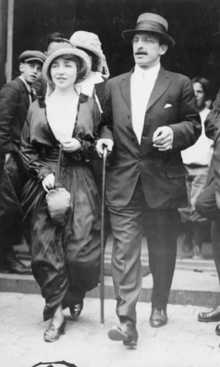
_-_Compassion_(1897).jpg)

